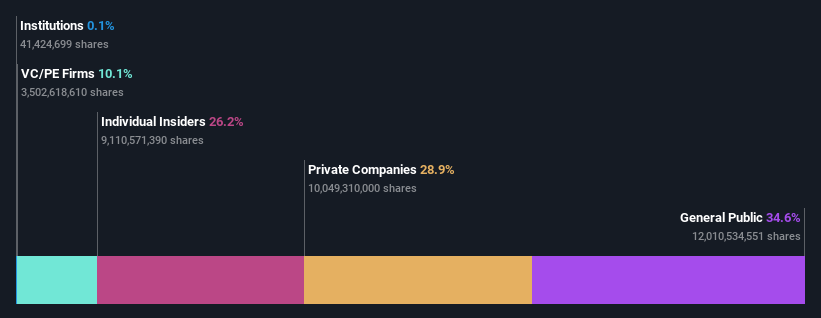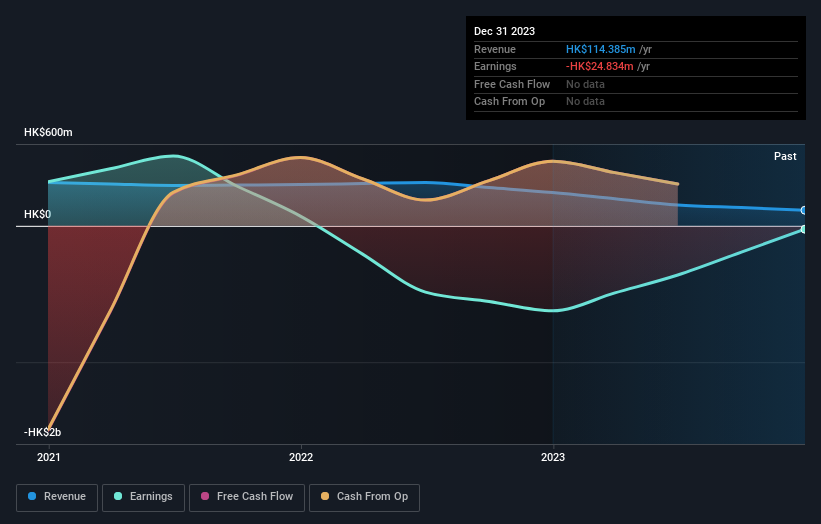- Hong Kong
- /
- Capital Markets
- /
- SEHK:245
China Vered Financial Holding Corporation Limited's (HKG:245) market cap dropped HK$382m last week; Retail investors bore the brunt

Key Insights
- The considerable ownership by retail investors in China Vered Financial Holding indicates that they collectively have a greater say in management and business strategy
- 54% of the business is held by the top 3 shareholders
- Insider ownership in China Vered Financial Holding is 26%
Every investor in China Vered Financial Holding Corporation Limited (HKG:245) should be aware of the most powerful shareholder groups. And the group that holds the biggest piece of the pie are retail investors with 35% ownership. That is, the group stands to benefit the most if the stock rises (or lose the most if there is a downturn).
And last week, retail investors endured the biggest losses as the stock fell by 15%.
Let's delve deeper into each type of owner of China Vered Financial Holding, beginning with the chart below.
View our latest analysis for China Vered Financial Holding

What Does The Lack Of Institutional Ownership Tell Us About China Vered Financial Holding?
We don't tend to see institutional investors holding stock of companies that are very risky, thinly traded, or very small. Though we do sometimes see large companies without institutions on the register, it's not particularly common.
There are multiple explanations for why institutions don't own a stock. The most common is that the company is too small relative to funds under management, so the institution does not bother to look closely at the company. It is also possible that fund managers don't own the stock because they aren't convinced it will perform well. China Vered Financial Holding might not have the sort of past performance institutions are looking for, or perhaps they simply have not studied the business closely.

China Vered Financial Holding is not owned by hedge funds. Our data shows that Vered Holdings Group Ltd is the largest shareholder with 29% of shares outstanding. With 15% and 10% of the shares outstanding respectively, Xueyi Liu and China Minsheng Investment Group are the second and third largest shareholders. In addition, we found that Feng Li, the CEO has 0.8% of the shares allocated to their name.
To make our study more interesting, we found that the top 3 shareholders have a majority ownership in the company, meaning that they are powerful enough to influence the decisions of the company.
While studying institutional ownership for a company can add value to your research, it is also a good practice to research analyst recommendations to get a deeper understand of a stock's expected performance. Our information suggests that there isn't any analyst coverage of the stock, so it is probably little known.
Insider Ownership Of China Vered Financial Holding
The definition of company insiders can be subjective and does vary between jurisdictions. Our data reflects individual insiders, capturing board members at the very least. The company management answer to the board and the latter should represent the interests of shareholders. Notably, sometimes top-level managers are on the board themselves.
Insider ownership is positive when it signals leadership are thinking like the true owners of the company. However, high insider ownership can also give immense power to a small group within the company. This can be negative in some circumstances.
Our most recent data indicates that insiders own a reasonable proportion of China Vered Financial Holding Corporation Limited. Insiders have a HK$574m stake in this HK$2.2b business. This may suggest that the founders still own a lot of shares. You can click here to see if they have been buying or selling.
General Public Ownership
With a 35% ownership, the general public, mostly comprising of individual investors, have some degree of sway over China Vered Financial Holding. While this size of ownership may not be enough to sway a policy decision in their favour, they can still make a collective impact on company policies.
Private Equity Ownership
With a stake of 10%, private equity firms could influence the China Vered Financial Holding board. Some investors might be encouraged by this, since private equity are sometimes able to encourage strategies that help the market see the value in the company. Alternatively, those holders might be exiting the investment after taking it public.
Private Company Ownership
Our data indicates that Private Companies hold 29%, of the company's shares. Private companies may be related parties. Sometimes insiders have an interest in a public company through a holding in a private company, rather than in their own capacity as an individual. While it's hard to draw any broad stroke conclusions, it is worth noting as an area for further research.
Next Steps:
While it is well worth considering the different groups that own a company, there are other factors that are even more important. Take risks for example - China Vered Financial Holding has 2 warning signs (and 1 which is potentially serious) we think you should know about.
If you would prefer check out another company -- one with potentially superior financials -- then do not miss this free list of interesting companies, backed by strong financial data.
NB: Figures in this article are calculated using data from the last twelve months, which refer to the 12-month period ending on the last date of the month the financial statement is dated. This may not be consistent with full year annual report figures.
New: AI Stock Screener & Alerts
Our new AI Stock Screener scans the market every day to uncover opportunities.
• Dividend Powerhouses (3%+ Yield)
• Undervalued Small Caps with Insider Buying
• High growth Tech and AI Companies
Or build your own from over 50 metrics.
Have feedback on this article? Concerned about the content? Get in touch with us directly. Alternatively, email editorial-team (at) simplywallst.com.
This article by Simply Wall St is general in nature. We provide commentary based on historical data and analyst forecasts only using an unbiased methodology and our articles are not intended to be financial advice. It does not constitute a recommendation to buy or sell any stock, and does not take account of your objectives, or your financial situation. We aim to bring you long-term focused analysis driven by fundamental data. Note that our analysis may not factor in the latest price-sensitive company announcements or qualitative material. Simply Wall St has no position in any stocks mentioned.
About SEHK:245
China Vered Financial Holding
An investment holding company, provides asset management, consultancy, financing, and securities advisory and brokerage services in Hong Kong, Mainland China, Japan, and Canada.
Flawless balance sheet very low.

